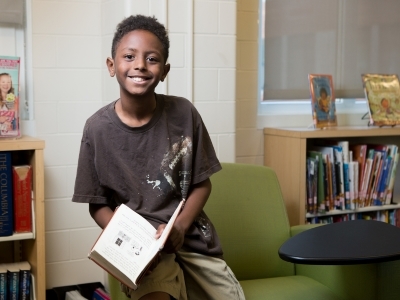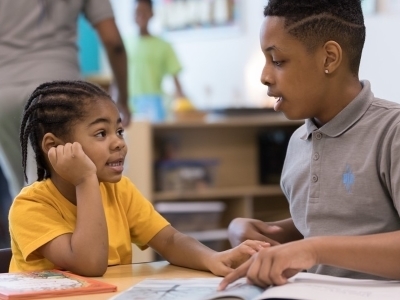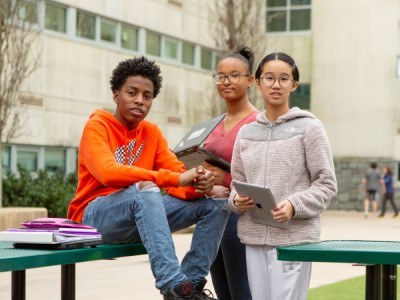This Thing with the Circles
Topics

Educators are rethinking the purposes, forms, and nature of assessment. Beyond testing mastery of traditional content knowledge—an essential task, but not nearly sufficient—educators are designing assessment for learning as an integral part of the learning process.
Circles offer educators the space and time to "have the conversation we need to be having" about assessment.
In August 2020, with the support of the Assessment for Learning Project (ALP), Carisa and Gary staged the Assessment for Good virtual conference. The conference was structured around hour-long circle conversations on a variety of topics related to assessment, ethics, relationships, activism, feedback, and anti-racism. Since then, we’ve run free, monthly discussion circles (first Thursday of each month), also on a variety of topics—mostly starting off in assessment, but wandering pretty far. We were asked by the folks at ALP to talk about why we chose to do this, what our experience has been, and what folks can learn from our experience. Here’s part of our discussion…
Gary: I know that circles aren’t new. But they feel new to me. It’s tempting to think that it has something to do with “these times we’re in,” but circle conversations predate the pandemic by decades. Schools have been using restorative justice circles since the naughts. My mom belonged to feminist, consciousness-raising circles in the 1970s. Indigenous peoples have been using circles for community and governance for centuries, and they are central to indigenous pedagogy. I had never actually been in a genuine circle until a few years ago. This may reflect the fact that I am a straight White guy, as privileged as can be in the dominant culture, and straight White guys in the dominant culture haven’t generally sought out restorative practices to survive and overcome the hegemony (though we absolutely should).
The first time I attended a circle that took off the top of my head and shouted to me, “This is something extraordinary!” was in Hawai‘i, at an education conference centered on the HĀ (Breath) initiative. The person leading was Auntie Pua—Puanani Burgess—an elder who somehow, in that place, in that short space of time, invited a level of care, reflection, and insight that I had never seen before. I saw that Carisa and our colleague Suzanne Edwards-Acton were doing circle work. Then, in June 2020, we participated in a virtual HĀ Summit, which was organized as circles and was also “something extraordinary!” Seeing circles work so well in the virtual space, I felt comfortable organizing our August conference in that way. Comfortable in the sense that I was stepping into something completely different, and I kept muttering, “Gee, I hope this works.” Carisa, you seemed much more sanguine about the whole thing. What is your history with circles?
Carisa: My first experience with circles goes back to high school where we used the Touchstones Discussion Project. It was an exposure to a different way of thinking and talking about ideas. It was highly structured from the teacher’s perspective, and the conversations were deep, varied, and open. Part of the process was letting go and allowing students to plan their own discussions. I think that magic in this project is that it was so structured, which fits with most traditional teaching styles, structure, order, protocols, and it slowly pushes teachers to let go of power that they’ve held over class discussions for so long. Teachers are given the space to listen, reflect, and observe while students work in circle to understand some pretty deep ideas about the world and their place in it.
When I became a teacher, I was so excited to use the program in my classroom, although I was never able to get other teachers on board. What I liked most about it was there was no homework required. Everyone could participate in the discussion whether or not they had come prepared. Passages were short, which required close reading, and topics were from classical works from philosophers, mathematicians, and theologians. The focus on classical views (aka White, western perspective) is the project’s biggest flaw. Although students bring their own unique perspectives and understandings, the texts really should be more diverse. Of course, there’s always room for improvisation in the classroom, and when I was a teacher, I was able to bring in some other works. And Touchstones is just one style of holding circle. I’ve experienced plenty of others over the years including circles held by Indigenous leaders, whose circles seem most natural.
So, yes, I knew our circle experience was going to work. We had good questions, good material to share, and some great facilitators, each who hold space in their unique ways. My worries were mostly about getting folks to want to come, during a pandemic, when everyone else is offering free sessions and Zoom fatigue had taken over. It was actually a great success. We ended up having everyone who was supposed to be in the circles, in the circles. That’s how I view the universe anyway. I think the draw was our title: Assessment for Good: Ethical, Equitable and Justice-Oriented Assessment. We spent a lot of time on the title. Why do you think it’s such a needed conversation?
Gary: There are so many answers to that question. Here’s one: the sort of inequities we’ve been talking about for decades are now so apparent that we must talk about them. To not talk about the cracks in the system would require cognitive dissonance to a level that… well, honestly, America and America’s education system are pretty good at cognitive dissonance. And there’s another reason the conversation about assessment needs to be discussed now: so many educators are coming to the conclusion, of their own accord, that the current system is harmful, inequitable, untruthful, and damaging. People don’t get into education to not do good, but the logistics and urgency pressed on them by circumstances and the system make it easy to squint and say good enough while struggling through the unbelievably stressful and hectic days. It’s not just us saying it. Educators in our circles have said, “This is the conversation we need to be having.”
The other reason it’s necessary is because the conversation about assessment is always necessary. Assessment is the point at which all aspects of the education system overlap. Every decision about kids, advancement, hiring, funding, curriculum, standards, etc., all of it is empowered or restricted by our approach to assessment. Good assessment is necessary for any type of quality education to happen. Bad assessment is poison. To quote Twitter colleague, Tyler Rablin, “You can't overcome bad assessment/grading. It's a fatal flaw.”
The reason it’s necessary to have these conversations in circle is because there is an emotional content to the conversation that surprises most—or has been ignored by most. We so very much want to be able to solve our problems via technical solutions. “Here’s a protocol, checklist, memo, or template that will solve all your problems.” But assessment—all of education, really—is both intensely relational and intimate. In a situation of genuine learning, teacher and student ask for a level of trust between one another that is extraordinary. Asking teachers to question their assessment practices is asking them to question beliefs, relationships, power dynamics, privilege, and so much more. It is a genuinely courageous thing to do, and that is why we have to “hold space for it.” This is a part of the “good” we are hoping for in our “for good” circles. Honestly, even having done a good number of these, I still get to the end of a circle and marvel a bit. Not just that it went well (which they all have), but that they feel as if they’ve gone well. Like we do a circle and I feel as if we are doing good and helping others do good. It’s kind of an honor to be able to feel that way.
So, what do you think the lessons for others might be from our work? ALP supported this work to sort of test the waters with circles. I wrote a little bit about that in another article, Ethics, Tension, Relationships, and Questions. But what do you think they should learn from us?
Carisa: First, time is important. Every educator knows this and yet we learned a lot about time through this experience. We did four one-hour circles each day with generous time in between to pause, reflect, stretch, eat. At the end of each day, I was tired, brain tired, which means body tired, and at the same time inspired and energized. It’s a feeling that often happens for me after a lot of good learning and conversation. I’m sure there’s a word somewhere in the universe for that feeling. The time after sessions is so important. Many times when you go to conferences it’s so jam packed with really great sessions and there’s not a lot of time to process or compartmentalize what’s just happened before you're off to the next great session you don’t want to miss. Learning experience designers for youth and adult learners need to pay attention to time, especially when tackling difficult tasks or subjects.
We also need time for reflection, one of the most important parts of a good assessment process. We can’t see all the learning that takes place inside a person’s mind, especially when getting folks to shift thinking about school structures and this culture of White supremacy from which most of these structures stem. Some of that learning can be seen when folks share in a circle, but a lot of it is unsaid. We need time for deeper reflection after powerful learning experiences in our schools and in our professional learning communities. We also need time to just be with our new thoughts. I am thankful that we built in the time between sessions for reflection.
Use open-ended questions on evaluations instead of rating scales. We knew we wanted feedback on how this experience was for participants and rating scales are never really useful for our learning as much as the narrative comments are. So, we ditched the rating scales and asked four questions:
- Why did you decide to sign up for the Assessment for Good Conference? Whether you ended up attending or not, what prompted your initial decision?
- Please talk about some deep thinking you did during the conference. What are conversations that moved or shifted you? What seemed new for you?
- Please talk about questions, challenges, misgivings, or deep thinking you will be doing because of stuff brought up by the circles. Where might you need more help/conversation?
- Please talk about your experience in the conference. What worked well and what didn't? How did Carisa and Gary do? Educating for Good is a new startup and any feedback—either for Gary or Carisa or the experience as a whole—is helpful.
We got some very thoughtful and honest feedback. It’s a little like the personal comments on report cards. I have always looked at those first. The numbers and letters tell a little bit, but the comments are where it’s at. That extra narrative takes time to craft and we appreciate everyone who was able to take that additional time. We should definitely apply this to our assessment systems. Narrative reporting should be the future in assessment systems.
I’m recognizing a motif in our learnings here... time. In our traditional assessment systems we spend a lot of it on things that are, in the end, either inconsequential or have really detrimental effects on self-esteem and future success and they reinforce systems of Whiteness. We need our system keepers to understand that time can be used in such meaningful ways in learning journeys, if we choose to prioritize assessment for learning and assessment for good. I’m going to end this conversation with a quote…
“But why do only unimportant things?” asked Milo, who suddenly remembered how much time he spent each day doing them.
“Think of all the trouble it saves,” the man explained, and his face looked as if he'd be grinning an evil grin—if he could grin at all. “If you only do the easy and useless jobs, you'll never have to worry about the important ones which are so difficult. You just won't have the time.”
–Norton Juster, The Phantom Tollbooth
Photo at top courtesy of Diva Plavalaguna, from Pexels




